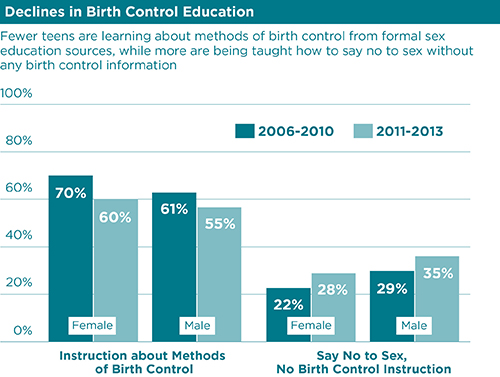Many U.S. teens are not receiving formal sex education, and fewer teens now than in the past are being exposed to important and timely information about a range of sex education topics, according to "Changes in Adolescents’ Receipt of Sex Education, 2006–2013" by Laura Lindberg, principal research scientist at the Guttmacher Institute, et al.
Dr. Lindberg and colleagues analyzed data on 15–19-year-olds from the 2006–2010 and 2011–2013 rounds of the Center for Disease Control and Prevention’s National Survey for Family Growth. Between the two survey periods, the proportion of teens who reported receiving formal education about birth control decreased from 70% to 60% among females and from 61% to 55% among males. Overall, in 2011–2013, 43% of adolescent females and 57% of adolescent males did not receive information about birth control before they had sex for the first time.
In addition to reductions in formal instruction about birth control methods among both genders, there were reductions between survey periods in the proportions of young women who reported receiving formal sex education on other topics as well:
- The study found declines in the proportion of young women who received formal instruction about how to say no to sex at all (from 89% to 82%), and of those taught how to say no to sex before first having sex (78% to 70%).
- At the same time, there was an increase in the share of young women receiving instruction only about how to say no to sex and not about birth control (from 22% to 28%).
- The proportions of young women taught about STDs and HIV/AIDS also declined (from 94% to 90% and from 89% to 86%, respectively), although it remains high.
Despite these declines in formal education, there was no increase during the study period in the proportion of teens who discussed these same sex education topics with their parents. One in five young women and one in three young men did not receive instruction about birth control from other formal sources or their parents.
"Relying on parents alone to provide teens with necessary information about sex is inadequate," says author Laura Lindberg. "Schools should provide medically accurate and comprehensive sex education, so teens have the information and skills they need to enjoy the best health possible."
The study also found that male and female teens from rural areas in particular experienced declines in many areas of sex education. Dr. Lindberg notes that this is troubling because compared with their urban peers, rural teens are more vulnerable to negative sexual health outcomes: They use contraceptives at first sex at lower rates than urban teens, and rural communities offer less access to sexual and reproductive health care services than urban communities.
Notwithstanding the declines of formal sex education available to teens, U.S. teen pregnancy rates are at historic lows and improved contraceptive use has been an important driver of this decline, according to previous Guttmacher research. Other data from the Centers for Disease Control have documented declines in the share of schools teaching a range of sex education topics.
"Teens are using contraceptives more consistently and more effectively. They could be doing even better if they were receiving quality sex education from a range of sources," says Heather Boonstra, director of public policy at Guttmacher. "Providing age-appropriate information about sexual and reproductive health to teens is smart and essential. National and state governments should increase funding for and prioritize formal sex education in school curricula, as they reach large numbers of students. Providing and directing teens to evidence-based and accurate online resources is also critical, and may be a way to reach teens who fall through information gaps."
"Changes in Adolescents’ Receipt of Sex Education, 2006–2013" by Laura Lindberg, Heather Boonstra and Isaac Maddow-Zimet of the Guttmacher Institute is available online in the Journal of Adolescent Health.
